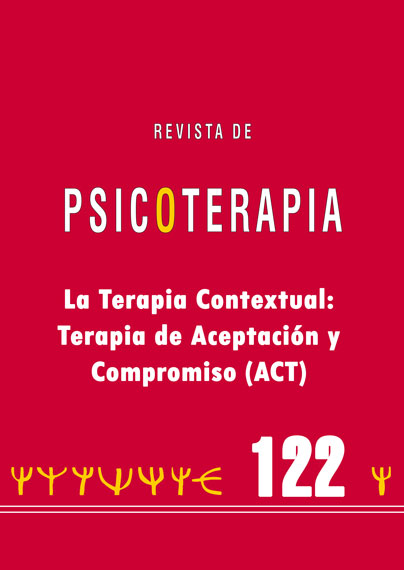Eficacia de la terapia de aceptación y compromiso centrada en pensamiento negativo repetitivo en fibromialgia: Un diseño de línea base múltiple aleatorizado
DOI:
https://doi.org/10.33898/rdp.v33i122.1150Palabras clave:
fibromialgia, terapia de aceptación y compromiso, pensamiento negativo repetitivo, preocupación, sintomatología emocionalResumen
El pensamiento negativo repetitivo (PNR), en la forma de rumia y preocupación, es un factor que puede generar un impacto negativo sobre la calidad de vida y sintomatología de los pacientes con fibromialgia (FM). El presente estudio analiza la eficacia de un protocolo breve de la Terapia de Aceptación y Compromiso (ACT) centrado en reducir PNR en cuatro mujeres con diagnóstico de FM. Se llevó a cabo un diseño de línea de base múltiple entre participantes aleatorizado. Las participantes completaron entre 4 y 6 semanas de línea base y, posteriormente, recibieron una intervención individual de 4 sesiones. El efecto de la intervención se evaluó realizando seguimientos hasta los 3 meses. Las cuatro participantes mostraron cambios clínicamente significativos en síntomas emocionales medidos a través del Depression Anxiety and Stress Scale – 21 (DASS-21¸ S. H. Lovibond y P. F. Lovibond, 1995) y el General Health Questionnaire – 12 (Ruiz et al., 2017a). Asimismo, las participantes mostraron mejoras significativas en parámetros relacionados con la calidad del sueño y mejoras en calidad de vida relacionada con la salud. En cuanto a las medidas de proceso, todas las participantes mostraron cambios clínicamente significativos en preocupación patológica y tres de ellas también en fusión cognitiva. Los cambios en acciones valiosas fueron más modestos. Los tamaños del efecto comparables a través de diseños fueron muy grandes y estadísticamente significativos para DASS-Total (d = 1.51), DASS-Depresión (d = 1.83), preocupación patológica (d = 1.79) y fusión cognitiva (d = 1.99).
Descargas
Descargas
Publicado
Cómo citar
Número
Sección
Licencia
Los autores/as que publiquen en esta revista aceptan las siguientes condiciones:
- Los autores/as conservan los derechos de autor y ceden a la revista el derecho de la primera publicación, con el trabajo registrado con la Creative Commons CC-BY-NC 4.0 Internacional, que permite a terceros citar el texto y usarlo sin alterarlo y sin beneficio económico, siempre que mencionen la autoría del trabajo y la primera publicación en esta revista.
- Los autores/as pueden realizar otros acuerdos contractuales independientes y adicionales para la distribución no exclusiva de la versión del artículo publicado en esta revista (p. ej., incluirlo en un repositorio institucional o publicarlo en un libro), siempre que indiquen claramente que el trabajo se publicó por primera vez en esta revista.
- Las opiniones expresadas en los trabajos son responsabilidad única de los/as autores/as, no reflejando en ningún caso las opiniones o políticas científicas de la revista.














